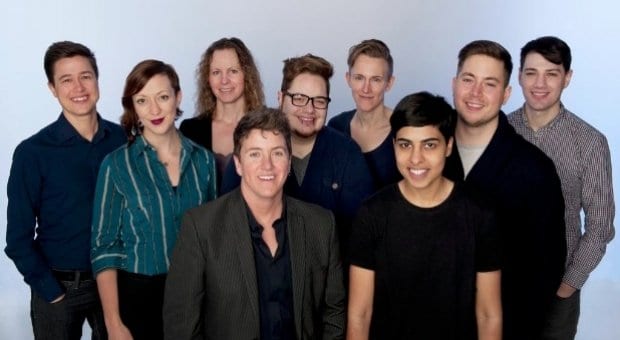If it were up to Drew Dennis, the future would look like Hillcrest Community Centre.
According to a list of recommendations drafted by Dennis and a committee of trans people and allies for the Vancouver parks board, released March 25, Hillcrest should be a model for recreation all over Vancouver — and Canada. The draft proposal aims to make Vancouver the most trans-friendly jurisdiction in the world.
Hillcrest is a slick new facility, built as a curling arena for the 2010 Winter Olympics. It features modern West Coast maple ceilings, oval panelled glass skylights, and another feature that Dennis appreciates even more: plenty of gender-neutral changing space.
In between the traditional male and female change rooms leading into the pool is a large “family” space, including individual stalls for any gender.
When Dennis visited the centre to research the committee’s proposals, the need for gender-neutral space was obvious.
“The multi-gender change rooms are busy, busy, busy,” Dennis says. “You didn’t see anyone coming out of the men or women’s change room saying, ‘Wow, that was full.’ But for the neutral space, there were sometimes five-minute waits.”
That shows, Dennis says, the need for more facilities to follow Hillcrest’s lead on more gender-inclusive areas.
Change rooms, however, are just the beginning. The Trans and Gender-Variant Working Group, of which Dennis is one of eight members, also recommended changing signs to be more inclusive (for example, changing the “family” sign to read “universal”), adding lockers and showers to pool decks for those who want to skip change rooms altogether, and increasing recreation programs aimed at trans people.
The committee’s recommendations come from nearly a year of consultation with trans people, parks workers and other people who use parks facilities such as pools, gyms and ice rinks.
One of the most important new measures, according to Dennis, is already underway: teaching staff to be more sensitive and aware of trans patrons. During the consultation process, Dennis helped train 500 Vancouver parks aquatic staff on how to more smoothly handle the needs of trans people.
Training so far, Dennis says, has been very successful. “I think for the most part, staff don’t want to offend people. They want to understand. When we asked if this [training] would be useful, there was a big ‘Yes, please!’”
Morgane Oger, secretary of the Vancouver Trans Alliance, agrees that staff training is key. “Our position is also that there are huge gains to be made for inclusivity just through training, education, and performance standards,” she wrote to Xtra.
In fact, says Trevor Loke, a parks board commissioner and liaison to the working group, change rooms and washrooms get altogether too much attention.
Despite some media reports that focused on the removal of traditional washroom symbols, Loke points out that the recommendations merely suggest that gendered symbols be removed from single-stall washrooms where they serve no purpose.
Some trans people interviewed for the report felt strongly about retaining marked male and female change rooms, he notes. “Just as the queer community doesn’t agree on everything, the trans community doesn’t either. Some trans people feel very strongly that they want to have gendered spaces. They made the transition and they deserve it.”
Oger would prefer if the recommendations pushed the city to make all change rooms gender-neutral — like those at Hillcrest. “That’s what I would want,” she says, “but I recognize there are pragmatic concerns involved.”
Both Oger and Dennis agree that the new proposal pushes Vancouver in the right direction.
“With new facilities, we are dealing with a blank canvas,” Dennis points out. “This is our opportunity. The trans kids of the future are not going to have to deal with these systemic problems.”
The Trans and Gender-Variant Working group will take feedback on the recommendations at a community meeting on Tuesday, April 2 at 7pm at the Coal Harbour Community Centre.
The final recommendations will be presented to the Vancouver parks board on April 28.


 Why you can trust Xtra
Why you can trust Xtra


